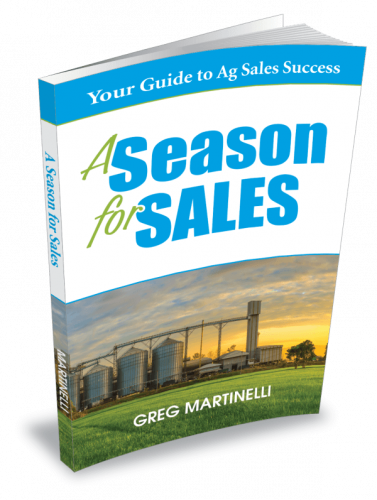Change your mindset on who you are in your industry
The shift from being a vendor in your industry to being part of your industry is a subtle, mental shift in your thinking. However, it has a huge impact on your confidence and what you bring to your customers.
Often, we consider ourselves spectators in the industry we sell into. Since we are not grain or livestock producers, we feel almost like an outsider when it comes to our industry. For some reason, the fact that we sell and ask for money, makes us feel as if we are not truly in the trenches of the business. We can feel almost marginalized. This feeling can be so strong, people don’t want to be described as salespeople. When I begin working with sales teams, there are those on some teams who will tell me very loudly and emphatically, “I’m not in sales! I don’t do the sales thing”.
These feelings are reinforced as we participate in trade shows designed for producers. All the programs are focused on the producers. Booth time is relegated to a short time in the morning, lunch and at a random break in presentations. We even get different colored name tags so attendees (producers) can tell us apart.
I’m not saying we need to change anything we are doing in the industry. I understand why we operate trade shows the way we do. What I am saying is that you can change the way you think about your involvement in the industry. Doing so, will provide several huge benefits in your sales career. Being recognized as a leader in your industry increases the trust that customers and prospects have with you. Speeding up the selling process.
First thing to do is realize that you are not in the fertilizer industry, you are in the crop production industry. You’re not in the feed industry, you are in the swine industry. Fill in your own example. But realize that you are not in the industry of what you sell, but you are in your customer’s industry. This mental shift alone is enough for some salespeople to embrace what they do.
Quit feeling apologetic or vague about what you do. You are not some vendor sitting on the sidelines waiting to extract money. You are a talented, experienced, and trusted advisor by some of the best producers in the industry. You not only deserve to be paid for it, but paid more due to your involvement in the industry. And you are worth it!
That involvement means you are networked with others in the industry so you can help your customers. Yes, you sell feed, but you are connected to vets, to university resources, and to industry leaders and influencers. You don’t just learn or connect with people in nutrition. Your customers realize how valuable your industry involvement is when they are in crisis. When their animals are sick or dying, when their crops are having disease outbreaks or yield issues. When they need help understanding and navigating the challenging world of precision Ag, farm financial decisions, grain marketing, etc.
These are the moments when they realize you are not just a vendor. You are a valuable resource that works hard for their success. And yes, you get paid to do it.
Back to our agronomist, nutritionist, Ag lender, account manager who doesn’t consider themselves a salesperson or doesn’t “do the sales thing”. First, everyone is selling something. At a minimum, you sold your company on your resume when you interviewed for the job. Secondly, the whole company is designed to create and keep customers. So, whatever you do, it’s for the customer. When I run into these individuals, I never try to change their mind. I simply ask them, “Well, what do you do then?” They usually explain all the things they do for customers or how they help the sales team help their customers. Sometimes they get it as they explain what they do. Sometimes they don’t. I imagine that day when they realize, “Shoot, I guess I really am in sales!”
Here’s a few suggestions
- Participate in your customer’s trade shows: attend, get a booth, sponsor, speak at, or volunteer to help on a committee.
- Participate in the trade association: join the board, be an expert in a particular area for the association, write for their newsletter, etc.
- Network key players: In crop production, reach out to several agronomists, microbial suppliers, chemical suppliers, seed companies. We are doing so much in the virtual world today that the cost of putting this group together is “virtually” free.
- Network your company experts into an on-line event. Give your customers and your industry a chance to see behind the curtain a bit. Points of interest for customers might be:
- What a loan committee looks at in approving your larger loans.
- How your PhD researchers set up feeding trials.
- How equipment is tested during product engineering and design.
- How satellite data is actually converted into real time data: Obviously, you would never reveal proprietary information. But we are in a very mature industry. Most of what we do is either common knowledge or easily found. You can certainly explain or share what you do without sharing exactly how you do it.
5. Network and participate in your customers customer’s business. This is more applicable to those of us that sell to agribusinesses. If you sell to cooperative locations, be involved with producer groups in that area. That’s where your customer will be focused. I sold to dealers. So, I was not only involved in the dealer business, but involved in the horse and poultry industry.
As you make that transition from vendor to trusted industry advisor, realize that it comes at a cost. You spend valuable time and money to become that. You attend, sponsor, and set up booths. You attend training events to learn how to be a better resource for your customers. You are available as an advisor on other parts of your industry. No, I wasn’t a lawyer, but I did know a few rules and regulations to help customers stay out of trouble.
All of this comes at a cost and should not be given away for free. By that, I mean you should not be price shopped penny for penny against a competitor who offers nothing more than a 1-800 number to place an order. If that is the case, find another market to sell into. If your market is so price sensitive that you have to sell your products at the same price, even though you are this trusted advisor, then the reward should be loyalty. Customer loyalty is another way of recognizing your value to them. They would buy from others if you weren’t who you are in the industry.
Congratulations, you have established a strong personal brand in your industry!


